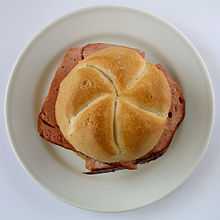Leberkäse

![]() Leberkäse (German, literally means 'liver cheese'; sometimes spelled Leberkäs or Leberka(a)s in Austria and the Swabian, Bavarian and Franconian parts of Germany and Fleischkäse in Saarland, Baden, Switzerland and Tyrol) is a specialty food found in the south of Germany, in Austria and parts of Switzerland, similar to bologna sausage. It consists of corned beef, pork, bacon and onions and is made by grinding the ingredients very finely and then baking it as a loaf in a bread pan until it has a crunchy brown crust.
Leberkäse (German, literally means 'liver cheese'; sometimes spelled Leberkäs or Leberka(a)s in Austria and the Swabian, Bavarian and Franconian parts of Germany and Fleischkäse in Saarland, Baden, Switzerland and Tyrol) is a specialty food found in the south of Germany, in Austria and parts of Switzerland, similar to bologna sausage. It consists of corned beef, pork, bacon and onions and is made by grinding the ingredients very finely and then baking it as a loaf in a bread pan until it has a crunchy brown crust.
History
Leberkäse is said to have been invented in 1776 by the cook of Charles Theodore, Elector of Bavaria, although this story has been heavily contested. The name "Leberkäse" literally translates to "liver-cheese" even though in Bavaria the dish traditionally contains neither liver nor cheese. Linguists believe that the etymology of the word either involves the Middle High German word lab (to clot) or the word laib (loaf), and the Slavic root quas (feast).
According to German food laws, only products called "Bavarian Leberkäse" are allowed not to contain liver; otherwise, there must be a minimum liver content of 4%. Some local variants must contain even more liver; for example, the liver content of "Stuttgarter Leberkäse" must be at least 5%. The type without liver is normally called Fleischkäse (meat cheese) if it is not made in Bavaria.
Methods of eating

Leberkäse is traditionally enjoyed a variety of ways, including:
- Most of the time it is served on a semmel (bread roll) while still hot and traditionally seasoned with mustard. The result, generally called Leberkäsesemmel (in Swabia and the Franconian parts of Bavaria, Leberkäsweckle, Leberkäsweggla or LKW in short), is a staple of South-German and Austrian fast food stalls, butcher shops and supermarkets.
- Cut into approximately finger-thick slices, usually served with süßer Senf (Bavarian sweet mustard) and soft pretzels, Sauerkraut or Kartoffelsalat (potato salad).
- Pan-fried ("abgebräunt" or "gebraten", browned), in which case it is commonly accompanied by a fried egg and German potato salad, or Bratkartoffeln (home fries) and sometimes spinach. This is a very common Biergarten dish.
- Cold, cut into very thin slices and used on a variety of sandwiches, usually seasoned with pickled cucumbers.
- Two slices of Leberkäse with a slice of ham and cheese in the middle are dipped into eggs and coated with breadcrumbs and then fried in the pan. This variant is called falsches Cordon Bleu which translates to mock Cordon Bleu.
Variants
Known variants include:
- Käseleberkäse, which adds small pieces of evenly distributed cheese to the mix
- Pikanter Leberkäse, which adds small pieces of pickles and bell peppers
- Pizzaleberkäse, which adds cheese, cut bell peppers, pickles and small cubes of salami, also known as Pizzakäse or for its similarity to pizza.
- Pferdeleberkäse (German Pferd = horse), which is indeed made of horse meat, otherwise not widely consumed in the German language area. Popular in Vienna, Austria.
In addition, many butchers have invented their own unique varieties.
External links
| Wikimedia Commons has media related to Leberkäse. |